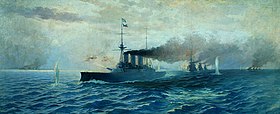Naval Battle of Elli
| Naval Battle of Elli | |||||||
|---|---|---|---|---|---|---|---|
| Part of First Balkan War | |||||||
 Painting by Vasileios Hatzis |
|||||||
|
|||||||
| Belligerents | |||||||
|
|
|
||||||
| Commanders and leaders | |||||||
| Rear Adm Pavlos Kountouriotis | Cpt Ramiz Bey | ||||||
| Strength | |||||||
| 1 armoured cruiser (Averof) 3 coastal defence battleships (Hydra, Spetsai and Psara) 4 destroyers (Aetos, Ierax, Panthir and Leon) |
2 battleships (Barbaros Hayreddin and Turgut Reis) 2 old battleships (Mesudiye and Âsâr-ı Tevfik) 1 protected cruiser (Mecidiye) 4 destroyers (Muavenet-i Milliye, Yadigâr-i Millet, Taşoz and Basra) |
||||||
| Casualties and losses | |||||||
| 2 dead | Heavy damage to the flagship, 18 dead, 41 wounded | ||||||
The Battle of Elli (Greek: Ναυμαχία της Έλλης, Turkish: İmroz Deniz Muharebesi) or the Battle of the Dardanelles took place near the mouth of the Dardanelles on 16 December [O.S. 3 December] 1912 as part of the First Balkan War between the fleets of the Kingdom of Greece and the Ottoman Empire. It was the largest sea battle of the Balkan Wars.
The Royal Hellenic Navy, led by Rear Admiral Pavlos Kountouriotis on board the flagship Averof, defeated the Ottoman Navy, led by Captain Ramiz Bey, just outside the entrance to the Dardanelles (Hellespont). During the battle, Kountouriotis, frustrated by the slow speed of the three older Greek battleships Hydra, Spetsai and Psara, hoisted the Flag Signal for the letter Z which stood for "Independent Action", and sailed forward alone at a speed of 20 knots, against the Ottoman fleet. Taking full advantage in her superior speed, guns and armour, Averof succeeded in crossing the Ottoman fleet's "T" and concentrated her fire against the Ottoman flagship Barbaros Hayreddin, thus forcing the Ottoman fleet to retreat in disorder. The Greek fleet, including the destroyers Aetos, Ierax and Panthir continued to pursue the Ottoman fleet off-and-on between the dates of December 13 and December 26, 1912.
...
Wikipedia
